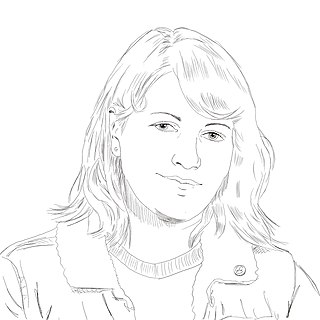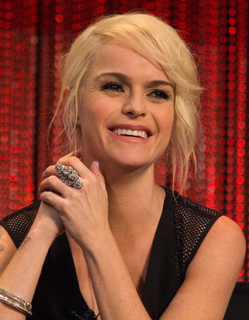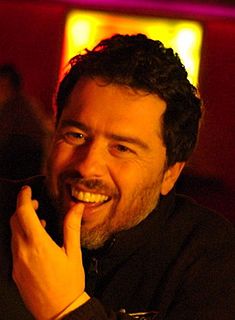A Quote by Kate Herron
I was really inspired by the film Minority Report when he sees the projection of his wife because she's no longer there, but she's life-size and in the room with him, and that's very painful.
Related Quotes
She looked at him then, but his image blurred behind tears that swelled into her eyes. She must leave. She must leave this room, because she wanted to hit him, as she had sworn she never would do. She wanted to cause him pain for taking a place in her heart that she wouldn't have given him if she'd known the truth. "You lied to me," she said. She turned and ran from the room.
I think there's an element in Milady where she sees her own innocence in D'Artagnan. In the very beginning, she's using him in a pretty cynical way. When she gets to know him, she sees qualities in him that she recognizes and it's almost like trying to remake the past, but of course, it doesn't work.
She was humbled, she was grieved; she repented, though she hardly knew of what. She became jealous of his esteem, when she could no longer hope to be benefited by it. She wanted to hear of him, when there seemed the least chance of gaining intelligence. She was convinced that she could have been happy with him, when it was no longer likely they should meet.
No man could bring himself to reveal his true character, and, above all, his true limitations as a citizen and a Christian, his true meannesses, his true imbecilities, to his friends, or even to his wife. Honest autobiography is therefore a contradiction in terms: the moment a man considers himself, even in petto, he tries to gild and fresco himself. Thus a man's wife, however realistic her view of him, always flatters him in the end, for the worst she sees in him is appreciably better, by the time she sees it, than what is actually there.
I love my wife. We've had a few slings and arrows across the room, but I'm not prepared to give in, you know? People say she saved my life, but at the same time, I saved her life, as well, I think. She's a great mother, she's a great wife, she's a great worker, she's a great manager. She's just great.
Billy covered his head with his blanket. He always covered his head when his mother came to see him in the mental ward - always got much sicker until she went away. It wasn’t that she was ugly, or had bad breath or a bad personality. She was a perfectly nice, standard-issue, brown-haired, white woman with a high school education. She upset Billy simply by being his mother. She made him feel embarrassed and ungrateful and weak because she had gone through so much trouble to give him life, and to keep that life going, and Billy didn’t really like life at all.
I don't know that Brandy [Burre] would ever categorize herself as being trapped, but I felt like I saw her being trapped. When she's cleaning the room and she puts the labels on the toys, that was something that my wife, who's also friends with Brandy, was very adamant that we try to capture. My wife said that showed to her Brandy's creative outlet because she can't be creative in the ways that she used to be or that she maybe wants to be in the future.
I went to film school and studied Alfred Hitchcock. I knew of Alma Reville existence, but had no idea really who she was or how influential she was on him. She stayed in the shadows. Go online, and there are hardly any images or film of her. She really stayed out of the limelight on purpose. She didn't want it, and I think that's one of the reasons that she's really lost in the shadows of Hitchcock's history to a degree.
The man who sanctifies his wife understands that this is his divinely ordained responsibility... Is my wife more like Christ because she is married to me? Or is she like Christ in spite of me? Has she shrunk from His likeness because of me? Do I sanctify her or hold her back? Is she a better woman because she is married to me?
































